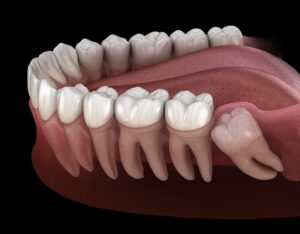You may have heard about wisdom teeth, especially in relation to the oral surgery to remove them. But what exactly are these teeth that grow into place later in life? And what impact can they have on your oral health?
You can feel more at ease about the extraction procedure related to these teeth when you know what to expect from the treatment and why it is often necessary. Read on to see responses from your dentist in Bensalem, PA regarding frequently asked questions about wisdom teeth and their removal.

Wisdom Teeth FAQs
What Are Wisdom Teeth?
Wisdom teeth refer to the third set of molars that tend to grow after an individual completes puberty, hence the moniker. These teeth were designed to help early humans grind their food when they had rougher diets thousands of years ago. Modern humans have less harsh diets now and therefore do not require these teeth.
Some people have four wisdom teeth, one in each corner of the mouth, while others have only a few. And some dental patients do not have any wisdom teeth at all. A dentist can monitor your wisdom teeth before they grow using x-ray imaging taken during a routine dentist appointment.
Why Do Wisdom Teeth Require Removal?
Because humans do not need wisdom teeth anymore, our jaws have become smaller and less able to accommodate these extra molars when they grow in. Some people can have their wisdom teeth grown in without complications, but a majority of dental patients cannot.
These teeth can overcrowd the rest of your teeth, making them shift out of a straight position. This will not only disrupt the look of your smile, but it can put you at a higher risk of cavities and other dental dangers.
Also, wisdom teeth often become impacted as they attempt to burst through the gums. This happens when the teeth get stuck in the jaw and cannot finish growing the way they need to. The patient might feel pain if this occurs and also have a high chance of infection.
A dentist will recommend extraction for impacted wisdom teeth as well as for teeth that appear to otherwise interfere with your oral health. They can usually spot this ahead of time when you attend routine dental check-ups.
What Can I Expect from Wisdom Teeth Extraction?
You might feel nervous about the invasiveness of a tooth extraction procedure, but your dentist will prioritize your comfort during this process. They will give you a local anesthetic to numb the affected areas of the mouth. And they can also offer you sedation to ensure you relax during the surgery.
Then the dentist will cut into the gums and bone to remove the teeth from your mouth. You will have surgical sites that require healing after this procedure. Your dentist will give you aftercare guidelines to ensure you recover properly.
You might feel both groggy and sore directly after this treatment, but you can start to return to your usual routine after 48 hours or so. Full recovery usually takes two weeks. Make sure you call your dentist if you notice any complications, like severe pain not managed with your dentist’s advice.
